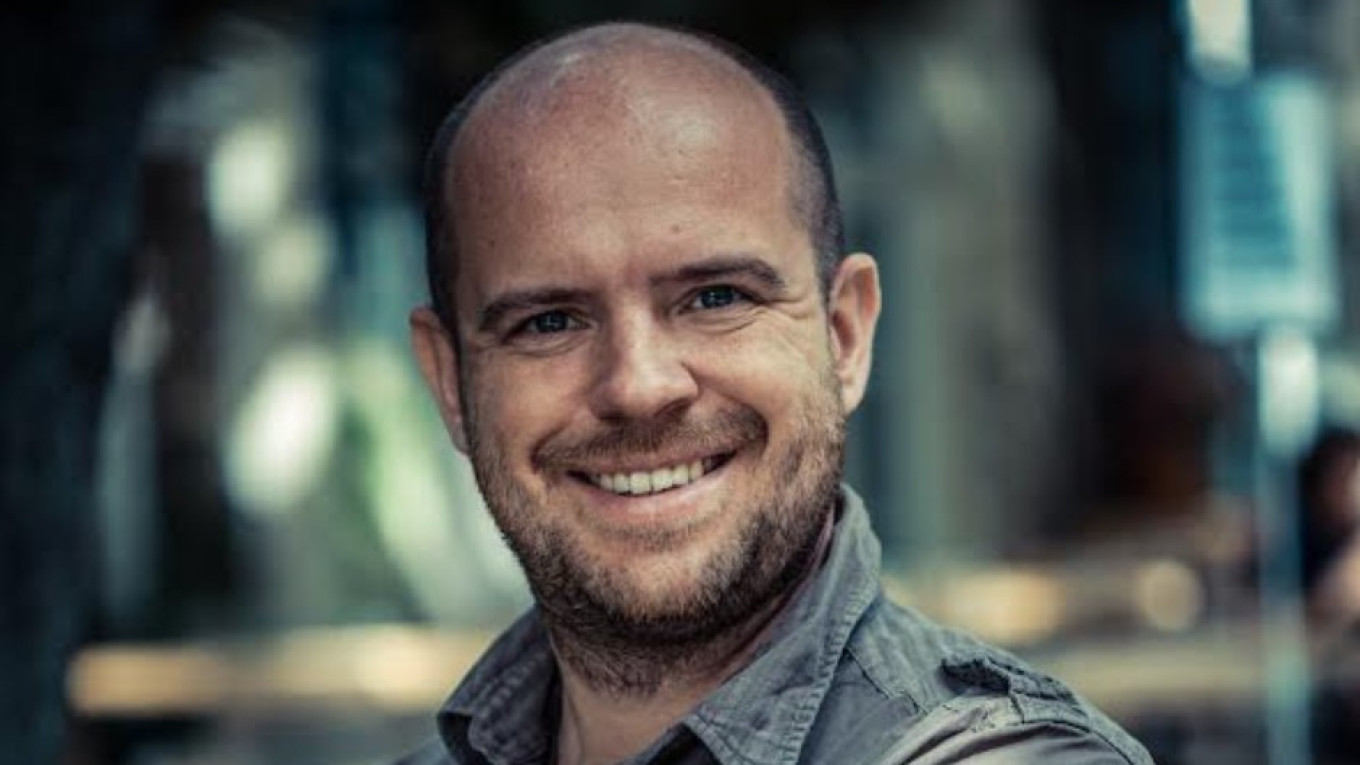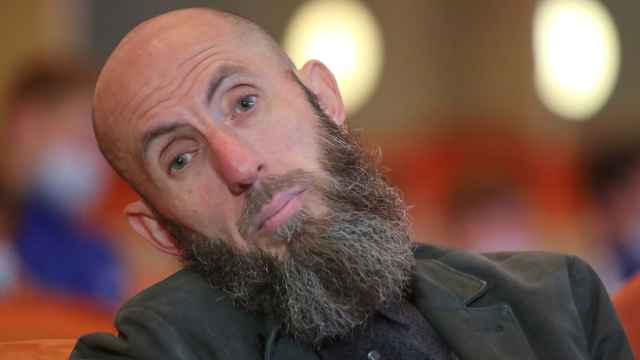“I think cooking is very close to politics,” Witold Szabłowski told The Moscow Times. “And politics is very close to cooking. What do people eat before they send their soldiers to war? What do they eat before they set the world on fire?”
“What’s Cooking in the Kremlin?” is the sixth book from the prolific Polish journalist and author Witold Szabłowski, and it has been shortlisted for the André Simon Food and Drink Book Awards. His previous works “How to Feed a Dictator” and “Dancing Bears” won praise for their imaginative attacks on authoritarianism, and this latest serving does not disappoint.
Beginning with the descendants of the Imperial Russian chefs and ending in the Putin era, Szabłowski tracks down cooks who served the rich and powerful – and those who kept ordinary bellies full (or tried to) throughout the country’s history. Into the mix are personal stories of the cooks of Chernobyl nuclear power plant, a baker who survived the Siege of Leningrad, the chefs behind the Soviet Union’s “Last Supper” at a dacha in Belarus, and many more.
The author plays down the success of his interviews as mere “stubbornness,” but the level of detail is truly remarkable. Szabłowski said that his own brief stint as a chef encouraged his more guarded interviewees to open up by giving them a common language. “If you know how to chop, how to cut, if you know about proportions and spices, it makes things easier with chefs,” he explains.
All the same, many Russians were suspicious of “a Pole asking lots of questions,” and Szabłowski had to push hard to gain access to sensitive sites like the space station, Roskosmos. The book took three years to write, and spanned ten trips to Ukraine, eight to Belarus, and fifteen to pre-war Russia, where the author is no longer welcome.
The recipes range from the lavish to the stark. We learn that Tsar Nicholas’s favourite lunch was “pasta with turtle doves,” while soldiers on the Eastern front roasted snails on a spit, and that Lenin’s wife had a three-meal repertoire: scrambled eggs with one egg, two eggs, or three.
Some of book’s most moving passages include “anti-recipes” from times of famine in Ukraine and Russia. Hanna Basaraba, one of the last survivors of the Holodomor, describes how she and her family lived off weeds during the man-made famine in the 1930s.
“Now and then one of the children I played with would just disappear. They stopped coming to nursery school. Nobody ever asked what had happened – it was obvious.”
Szabłowski witnessed the last meeting between Hanna and her cousin Vera, another survivor who died shortly after telling her story. These historic testimonies are particularly poignant as Russia continues to strike villages that endured the Great Famine.
There is plenty of humour in these pages, but the tone is never jarring. A stand-out character is Viktor Belyaev, a chef who worked at the Kremlin for 40 years, and served Brezhnev, Gorbachev, Yeltsin, Putin, and countless foreign leaders and dignitaries. In his interview with The Moscow Times, Szabłowski speaks warmly of his friendship with Belyaev, who died of Covid in 2022.
The author described the master chef as “the good spirit” of this book. He ate as Belyaev’s guest and singled out his signature blinchiki as “incredible.” These were the pancakes that Margaret Thatcher adored.
In a poignant afterword, Szabłowski explains that some of the cooks he interviewed have stopped speaking to him since the full-scale invasion.
“That’s how propaganda works,” he said. “I miss my trips to Russia and talking to Russians, but I wasn’t surprised. […] Russia has to remove Lenin from Red Square: this is a country that keeps [the body of] a mass murderer at the heart of its capital.”
The only drawback is the framing of the UK and US editions. The Polish original is subtitled “How to Build an Empire with a Knife, Ladle, and Fork,” making it clear that this is a book about imperialism and all its follies. Ukrainians in 2024 might hesitate to pick up this book, with its blood red “Kremlinology” cover – which is a shame, as the passages about Ukraine, and Tatar Crimea are among the writer’s finest.
“What's Cooking in the Kremlin: From Rasputin to Putin, How Russia Built an Empire with a Knife and Fork"

From Chapter XII The First Return of Viktor Belyaev
I cooked for Nixon for several days and he was very satisfied, until one day he simply swung by the kitchen. From the doorway he asked, “Who’s the chef here?” I was summoned. “Good morning,” I stammered in English. He must have been expecting some big fat Ivan with a mustache. And here I was. A guy from Izmaylovo. He was so pleased to be able to talk to a young Russian that he started coming by every day. And he questioned me: What was life like for young people? How long did I wait for an apartment? How much did this or that cost? I felt awkward about him coming to see me like that, but the boss said it was all right, there was nothing wrong with it. And that I should talk to him if that was what he wanted.
One day I plucked up the courage to say I was pleased that he liked my food. But that in my view he was missing the best feature of Russian cooking.
“Oh?” he said, intrigued. “What is that?”
“The soups, Mr. President,” I said, because he always left the soup. “Russia is famous for its delicious soups. We have borscht, we have solyanka, we have ukha. They’re all very good for you. Especially for men,” I said.
“It’s too late for me now,” he said, shrugging.
“Mr. President,” I replied, “it’s never too late. Soups are rejuvenating. Give them a try.”
I knew he was a keen angler and loved fish, so the next day I made ukha for him. He ate it, asked for a second helping, and ate that too.
“It’s really good,” he told me. “I think I’ll have to find myself a Russian cook in America.” He smiled.
But the most extraordinary thing happened on the final day of Nixon’s visit, when he asked me to show him Moscow. My boss agreed, so Nixon took just one bodyguard, and off we went. He didn’t want to see the historical sights; he wanted to see how normal people lived. We went to the Cheryomushki District, because he’d been there before with Brezhnev several years earlier. When we got there Nixon asked where the local market was—he remembered it from that previous visit. He imagined that because he was without his entourage, with just a bodyguard and me, no one would recognize him and he’d get a look at ordinary life. So we went to the Cheryomushki market.
Of course everyone there recognized him, and a swarm of people came running up, giving him flowers, fruit, vegetables, and honey. I had to hold it all then lug it around, while Nixon just about wept with emotion.
At some point a very old woman emerged from the crowd, the kind of woman who sits at the market selling garlic and a few sunflower seeds to supplement her pension. She gave him the entire sunflower head that she had for sale. And this is what she said: “Mr. President, I have nothing else to give you. But I’d like to ask you for one thing in exchange. I lost two sons in the war. War is the most terrible thing that can happen on earth. Please, please, do everything you can to make sure there are no more wars.”
Nixon hugged her and gave her some sort of answer, but he was clearly very moved. We returned to the villa where he was staying, but he spent a long time walking around the park, turning it all over in his head.
Then I made him farewell ukha, and he suggested we have our photograph taken together and then left.
7.
I have overslept and been late for work only once in my life, but it was the worst possible occasion, because that day I was making breakfast for Margaret Thatcher. She was in Moscow with an entire delegation. They’d stayed up until late at night, and their flight home was at five a.m. The boss had suggested I sleep over at the Kremlin, on a sofa. But I can’t bear sleeping away from home, Witold. So I thanked him, and a Kremlin car took me home. I left work at one a.m., though I’d have to be back again at 3:30. I ordered a car from the Kremlin, set my alarm clock . . . and didn’t hear it ring.
I woke up at 3:30—and started to panic. I alerted the entire family, my wife and children; my wife ironed my shirt, and my mom, who lived with us, helped me put on my pants. And I called the Kremlin housekeeper to explain what had happened and asked: Please open a can of peas, beat the eggs for the pancakes, and start boiling the water for me so it’s simmering by the time I arrive.
But the worst was ahead of me—the car. This was Moscow in the 1980s—there were no taxis, and it was an hour on foot to the Kremlin. And the rule for the Kremlin chauffeurs who drove around the city collecting the staff was that they waited for a maximum of half an hour. If you didn’t show up in that time, it was your problem. You’d do the explaining to your boss.
So I thought to myself, there’s no chance the car is still there. With my heart in my throat, I called the Kremlin dispatcher, praying for my good friend Luba to be on duty.
It was Luba who picked up. Everything was all right now.
“Luba, I overslept!” I screamed. “And we’ve got Margaret Thatcher! Do something, help, I have to make her breakfast!”
“Ooh,” said Luba, “that’s bad.”
And she sent me another car. I put on my shirt and tie, ran downstairs, got into the car and . . . a second one drove up. It turned out the driver had made an exception and had waited for me.
So off we went, with me in one car and the other behind us. At the entrance to the Kremlin the soldiers saluted us, I saluted back—and began to laugh. Those guards gave me such a look.
“What the hell, Viktor, why scare us like that? We thought it was some bigwig coming in.”
“You’ll soon get used to it, boys,” I replied. “From now on I’m always going to travel this way.” That made them laugh.
Then I raced upstairs. Blinis, appetizers, cheese, sausage, ham—I quickly sliced it all.
I made it in time by a hair.
Thatcher came to thank me for the cooking, just as Nixon had. In fact, it was funny, because the first time she was due to come, the other chefs had told me there was no need to be concerned because she never ate what we cooked for her. They said she had no chef at home but did her own cooking, and she wasn’t fond of food cooked by others.
So for her first breakfast in Moscow I made a little of everything, but I was ready for her either to eat nothing at all or to just jab her fork at her plate a bit. I gave her two salads, a little buckwheat, some cold meat, toast, jam, and pancakes—blinis—and got on with making the lunch.
Imagine my surprise ten minutes later when the waiter came in with an empty plate—the blinis were gone.
“She wants some more,” he said.
What the heck—more? But I thought she wasn’t going to eat anything!
In a panic I cracked some eggs, mixed them with water, milk, and flour, and fried two more blinis at top speed. The waiter served them, then came back in.
“And again.”
I think she had eight of them. Even her colleagues were surprised she liked them so much.
Excerpted from “What's Cooking in the Kremlin: From Rasputin to Putin, How Russia Built an Empire with a Knife and Fork,” (US version) or "What's Cooking in the Kremlin: A Modern History of Russia through the Kitchen Door" (UK version), written by Witold Szabłowski and translated from Polish by Antonia Lloyd-Jones, published by Penguin Random House Publishing Group. Copyright © 2021 by Witold Szabłowski, Translation copyright © 2023 by Antonia Lloyd-Jones. Used by permission. All rights reserved. For more information about the authors and this book, see the publisher’s site here.
A Message from The Moscow Times:
Dear readers,
We are facing unprecedented challenges. Russia's Prosecutor General's Office has designated The Moscow Times as an "undesirable" organization, criminalizing our work and putting our staff at risk of prosecution. This follows our earlier unjust labeling as a "foreign agent."
These actions are direct attempts to silence independent journalism in Russia. The authorities claim our work "discredits the decisions of the Russian leadership." We see things differently: we strive to provide accurate, unbiased reporting on Russia.
We, the journalists of The Moscow Times, refuse to be silenced. But to continue our work, we need your help.
Your support, no matter how small, makes a world of difference. If you can, please support us monthly starting from just $2. It's quick to set up, and every contribution makes a significant impact.
By supporting The Moscow Times, you're defending open, independent journalism in the face of repression. Thank you for standing with us.
Remind me later.







